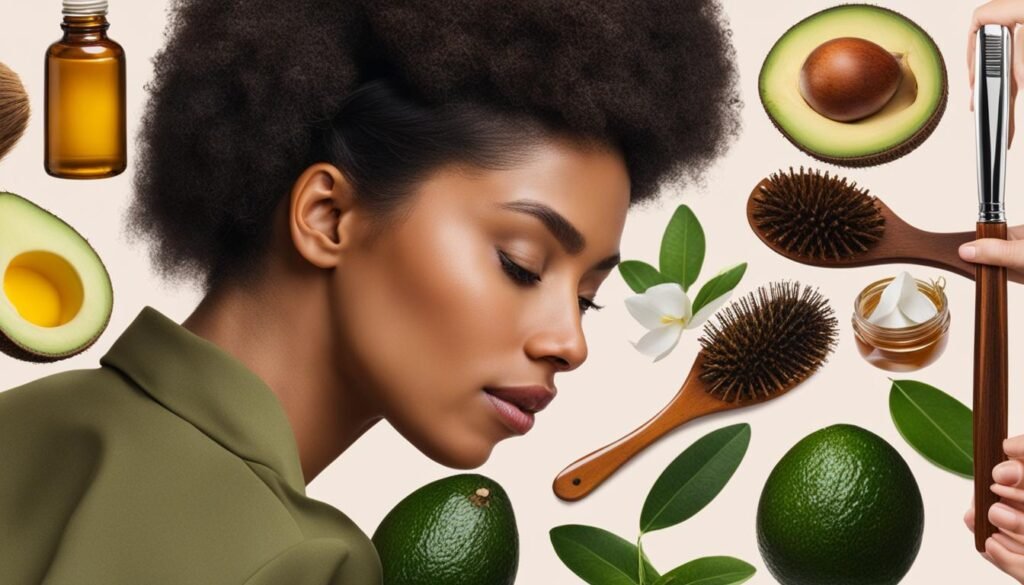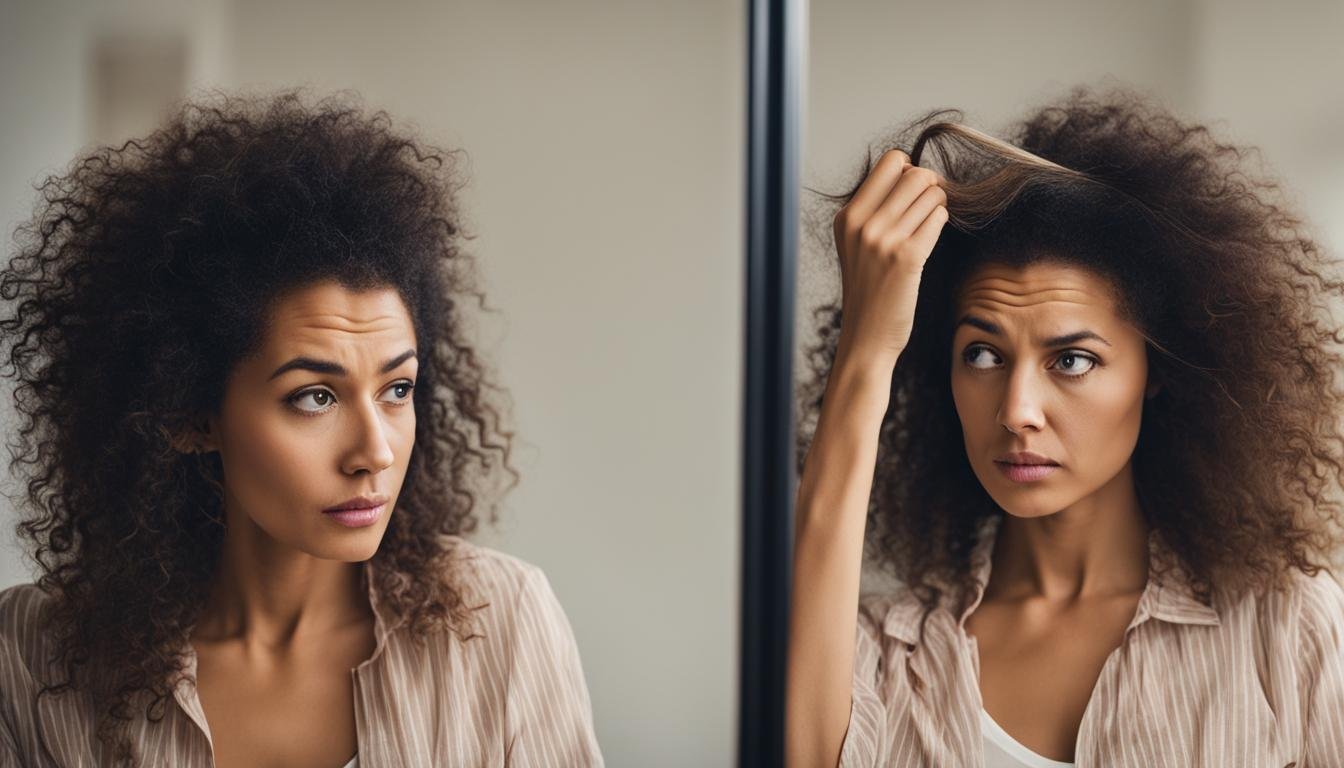As we age, our hair goes through changes that can result in dry, frizzy hair. Understanding the causes of frizzy hair in aging hair is important in order to effectively manage and prevent it. In this article, we will explore the factors that contribute to frizzy hair as we age, as well as provide tips and products to help you combat frizz and maintain healthy, lustrous hair.
As our bodies undergo hormonal shifts and a decrease in oil production, the texture of our hair changes. It becomes drier, coarser, and thinner over the years. In addition, the reduction in pigment production leads to grey hair, which further changes the structure of the hair and contributes to frizz.
To prevent and manage frizzy hair as we age, it is important to incorporate moisturizing products into our hair care routine. Hydrating shampoos, conditioners, and serums can help nourish and soften dry, frizzy hair. Avoiding excessive heat styling and regularly trimming our hair can also keep it healthy and manageable.
Eating a nourishing diet and using the right products can also help combat frizzy hair as we age. Foods rich in proteins, fats, and carbohydrates, along with nutrients like biotin and omega-3 fatty acids, can promote healthy hair growth. Additionally, using products specifically designed for aging hair and its unique needs can help revive your hair and control frizz.
By incorporating these tips and products into your hair care routine and embracing the natural changes in your hair with confidence, you can maintain healthy and lustrous hair as you age.
Understanding the Causes of Frizzy Hair in Aging Hair
As we age, our hair undergoes changes that can result in frizziness. Several factors contribute to this phenomenon, including a reduction in oil production from the scalp and a decrease in melanocytes, the cells responsible for hair color. These natural aging processes can lead to dryness, changes in the hair structure, and the appearance of grey hair.
One of the primary causes of frizzy hair in aging individuals is the decrease in oil production. The scalp produces less natural oil, resulting in dryness and a lack of moisture. This dryness can cause the hair to become coarse, brittle, and prone to frizz.
In addition, the decrease in melanocytes, which happens as we age, affects the hair’s color and structure. The pigment-producing cells produce less melanin, leading to the appearance of grey hair. Along with the change in color, the hair structure also undergoes alterations, becoming thinner and more delicate. These changes contribute to frizz and difficulty in managing the hair.
To visualize these causes, refer to the table below:
| Causes | Effects |
|---|---|
| Reduction in oil production | Dryness, lack of moisture, frizz |
| Decrease in melanocytes | Grey hair, changes in hair structure, frizz |
To combat frizzy hair caused by aging, it is essential to moisturize the hair and scalp regularly. This can be achieved by using hydrating shampoos, conditioners, and serums that provide nourishment and replenish moisture. Avoiding excessive heat styling and opting for gentle haircare practices will help prevent further damage and dryness. Trimming the hair regularly removes split ends and promotes healthier hair growth.
Embracing these natural changes and adopting a hair care routine suited for aging hair can help manage frizz and maintain healthy locks. With the right approach, it is possible to embrace aging hair with confidence and enjoy beautiful, frizz-free hair despite the natural aging processes.
Tips for Managing Frizzy Hair in Older Adults
As we age, our hair undergoes changes that can lead to frizz and dryness. To keep your hair healthy and manageable, here are some tips:
1. Incorporate Moisturizing Products
Use hydrating shampoos, conditioners, and serums specifically designed for aging hair. These products contain nourishing ingredients that can help soften and moisturize dry, frizzy hair. Look for products that are rich in natural oils and vitamins.
2. Avoid Excessive Heat Styling
Excessive heat can further dry out and damage aging hair, leading to increased frizz. Instead of using hot tools regularly, opt for natural hairstyles or use heat protectants before styling. This will help minimize heat-related damage and keep your hair smoother.
3. Get Regular Haircuts
Regular trims can help remove split ends, which can contribute to frizz. By keeping your hair trimmed, you can maintain its health and prevent further breakage. Consult with a professional hairstylist to determine the best haircut and style for your hair type and desired look.
4. Nourish Your Hair from Within
A well-balanced diet rich in proteins, fats, and carbohydrates can provide essential nutrients for healthy hair. Foods like spinach, berries, avocados, and eggs are excellent sources of vitamins and minerals that promote hair health. Additionally, staying hydrated by drinking enough water can help combat dryness.
5. Consider Protective Styles
Protective hairstyles can help minimize manipulation and reduce friction on your hair, which can lead to frizz. Consider hairstyles such as braids, buns, or twists that keep your hair contained and protected. This will not only help manage frizz but also prevent damage to your hair.
By following these simple tips, you can effectively manage frizzy hair as you age and keep your locks looking healthy and vibrant.
| Hair Care Tips for Aging Hair | Preventing Frizz in Older Hair | Managing Frizzy Hair with Age |
|---|---|---|
| Incorporate moisturizing products | Avoid excessive heat styling | Get regular haircuts |
| Maintain a nourishing diet | Consider protective styles |
Reviving Aging Hair: Products for Frizz Control
When it comes to reviving aging hair and controlling frizz, there are several products available that can make a noticeable difference. These products are specifically designed to address the unique needs of aging hair, providing much-needed moisture, nourishment, and frizz control.
Hydrating Shampoos and Conditioners
One of the most effective ways to combat frizz in aging hair is by using hydrating shampoos and conditioners. These products are formulated with ingredients that replenish moisture, restore shine, and improve the overall health of your hair. Look for products that contain natural oils, such as argan oil or coconut oil, which help to hydrate and smooth the hair shaft.
Oil-Based Serums
To tame frizz and keep your hair smooth throughout the day, consider incorporating an oil-based serum into your hair care routine. These serums provide intense hydration and create a protective barrier against humidity, preventing frizz and flyaways. Apply a small amount of serum to the ends of your hair and work your way up, focusing on the areas that tend to get the most frizzy.
Heat Protectants
If you frequently use hot tools like flat irons or curling wands, it’s important to protect your hair from heat damage, which can exacerbate frizz. Before styling your hair, apply a heat protectant spray or serum to create a barrier between your hair and the heat. This will help prevent frizz and maintain the health of your aging hair.
Hair Masks and Supplements
For an added boost of nourishment and to promote stronger, fuller-looking hair, consider incorporating hair masks and supplements into your routine. Hair masks are deep conditioning treatments that provide intensive hydration and repair damaged hair. Look for masks that contain ingredients like shea butter, aloe vera, or keratin. Additionally, supplements that support hair health, such as biotin or collagen supplements, can provide essential nutrients that promote the overall health and vitality of your hair.
When choosing products for frizz control in aging hair, it’s important to select ones that are specifically designed for the unique needs of aging hair. These products are formulated to address the factors that contribute to frizz in aging hair, such as dryness, changes in hair structure, and decreased oil production. By incorporating these products into your hair care routine, you can effectively revive your aging hair and regain control over frizz.
| Product | Description |
|---|---|
| Hydrating Shampoos and Conditioners | These products provide hydration and nourishment to combat frizz and improve the overall health of aging hair. |
| Oil-Based Serums | Serums formulated with natural oils create a protective barrier, helping to tame frizz and keep hair smooth. |
| Heat Protectants | These products shield the hair from heat damage, preventing frizz caused by hot styling tools. |
| Hair Masks and Supplements | Masks and supplements provide intensive hydration, repair damaged hair, and promote healthier, fuller-looking hair. |
Lifestyle Changes for Healthy Aging Hair
In addition to using the right hair care products, making certain lifestyle changes can significantly contribute to maintaining healthy hair as you age. The following tips will help you prevent frizz in older hair and manage frizzy hair with age:
- Stay hydrated: Drinking enough water is crucial for combating dryness in your hair. Adequate hydration nourishes your hair follicles from the inside, promoting healthy hair growth and reducing frizz.
- Maintain a balanced diet: Consuming a well-rounded diet that includes protein, vitamins, and minerals is essential for healthy hair. Foods like lean meats, fruits, vegetables, and whole grains provide the necessary nutrients for strong and lustrous hair.
- Avoid excessive heat styling: Exposing your hair to excessive heat can cause damage and lead to frizz. Minimize the use of hot tools, such as hairdryers, curling irons, and straighteners. When you do use them, apply a heat protectant beforehand.
- Choose gentle hair care practices: Opt for a wide-tooth comb instead of a brush, as it reduces hair breakage and minimizes frizz. Avoid hairstyles that put excessive tension on your hair, such as tight ponytails or braids.
- Rinse with cold water: After conditioning your hair, rinse it with cold water. Coldwater helps seal the hair cuticles, locking in moisture and reducing frizz.
By incorporating these healthy habits into your routine, you can promote the overall health of your aging hair and prevent frizz.

Expert tip:
“Incorporating lifestyle changes, such as staying hydrated, maintaining a balanced diet, and being mindful of heat styling, can greatly improve the health and appearance of aging hair. These small adjustments can make a significant difference in managing frizz and maintaining lustrous locks.” – Dr. Sarah Johnson, Dermatologist
Embracing Aging Hair with Confidence
The natural changes in our hair as we age are something that everyone experiences. It is essential to embrace these changes and practice self-care to maintain healthy and lustrous hair. Although we can’t stop the aging process, there are steps we can take to keep our hair healthy and manage frizz.
One key aspect of embracing aging hair is using the right products. Investing in moisturizing shampoos, conditioners, and serums specifically designed for aging hair can provide the necessary nourishment to combat dryness and frizz. Incorporating oil-based serums can also help tame frizz and keep our hair smooth throughout the day.
In addition to using the right products, making lifestyle adjustments and adopting healthy hair care practices are crucial. Avoiding excessive heat styling, opting for gentle hair care practices like using a wide-tooth comb, and avoiding hairstyles that put too much tension on the hair can prevent damage and further frizz. Rinsing hair with cold water after conditioning helps seal in moisture and promotes healthier hair.
By taking care of our aging hair and embracing the changes with confidence, we can feel good about our hair as we age. It’s important to remember that these changes are a natural part of life, and accepting them while practicing self-care will contribute to healthier and more beautiful hair.
